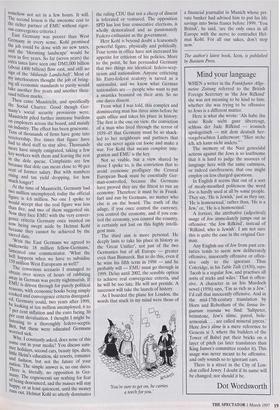Mind your language
WHEN a writer in the Frankfurter Allge- meine Zeitung referred to the British Foreign Secretary as 'the Jew Rifkind' she was not meaning to be kind to him; whether she was trying to be offensive to Jews is a different matter.
Here is what she wrote: 'Ms habe ihn seine Rede nicht ganz iiberzeugt, schloss der Jude Rifkind — ironisch apologetisch — mit dem deutsch her- vorgebrachten Lutherwort: "Hier stehe ich, ich kann nicht anders." ' The memory of the Nazi genocidal actions against the Jews is so loathsome that it is hard to judge the nuances of language here with the same calmness, or indeed carefreeness, that one might employ on less charged questions.
In English it seems that out of a sort of mealy-mouthed politeness the word Jew is hardly used at all by some people. They say, 'He is Jewish,' just as they say, `He is homosexual,' rather than, 'He is a Jew,' or, 'He is a homosexual.'
A fortiori, the attributive (adjectival) usage of Jew immediately jumps out as offensive: 'the Jew Riflcind', instead of `Rifkind, who is Jewish'. I am not sure this is quite the case in the original Ger- man.
Any English use of Jew from past cen- turies tends to seem now deliberately offensive, innocently offensive or offen- sive only to the ignorant. Thus Coleridge, in his Table Talk (1830), says: `Jacob is a regular Jew, and practises all sorts of tricks and wiles.' That is offen- sive. A character in an Iris Murdoch novel (1956) says, 'I'm as rich as a Jew.' I'd call that innocently offensive. And in the mid-17th-century translation by Horn and Robotham of the Janua lin- guarum reserata we find: 'Saltpeter, brimstone, Jew's slime, patrol, bole- armoniak . are called mineral juyces.' Here Jew's slime is a mere reference to Genesis xi 3, where the builders of the Tower of Babel put their bricks on a layer of pitch (as later translators than King James's committee render it). This usage was never meant to be offensive, and only sounds so to ignorant ears.
There is a street in the City of Lon- don called Jewry. I doubt if its name will be changed; nor should it be.
Dot Wordsworth


























































 Previous page
Previous page